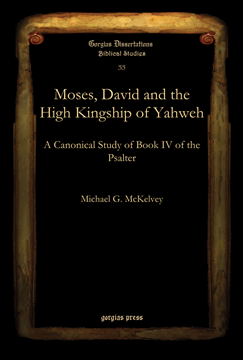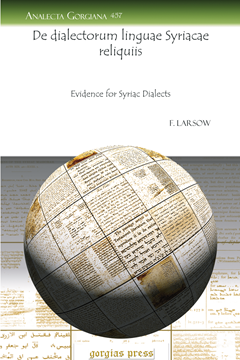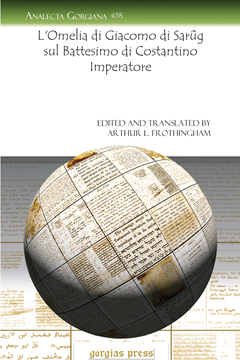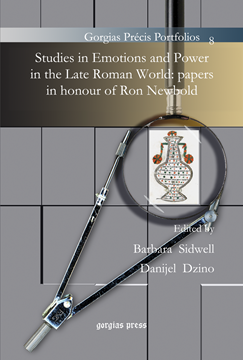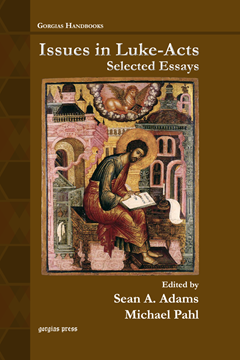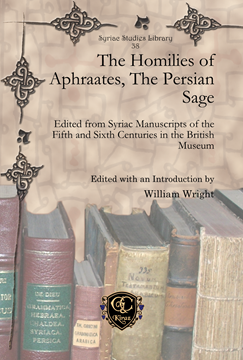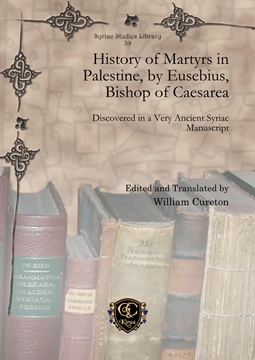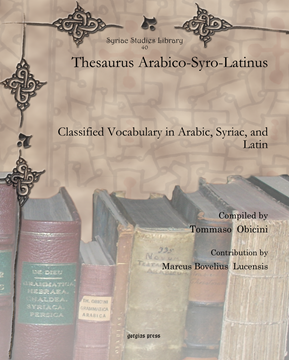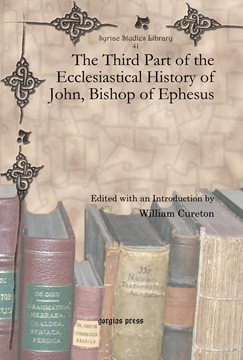Moses, David and the High Kingship of Yahweh
A Canonical Study of Book IV of the Psalter
Series: Gorgias Biblical Studies 55
ISBN: 978-1-61143-682-2
Has the Old Testament Psalter been purposefully arranged? Does this arrangement convey an overall message? This book enters into the growing discussion regarding the canonical arrangement of the Psalms by examining Book IV (Pss 90-106) and considering the book's overall theological and thematic message within the literary context of the Psalter. This volume argues that Psalms 90-106 have been purposely arranged as a rejoinder to the previous three books, in response to the rise and fall of Davidic kingship. This hypothesis is tested by examining how Psalms 90-106 may have been purposely organized as a collection.
$177.00 (USD)
Sindban, oder die sieben weisen Meister
Syrisch und Deutsch
Edited and Translated by Friedrich Baethgen
Series: Analecta Gorgiana 456
ISBN: 978-1-60724-894-1
This volume is Baethgen’s dissertation from the University of Leipzig, in which he presents the Syriac text, based on the only manuscript of the work (from Berlin), along with an annotated German translation and an introduction.
$45.00 (USD)
De dialectorum linguae Syriacae reliquiis
Evidence for Syriac Dialects
By F. Larsow
Series: Analecta Gorgiana 457
ISBN: 978-1-60724-895-8
In this brief work, Larsow discusses the evidence for Syriac dialects, other than the well-known eastern and western varieties, and he especially makes use of material from the lexica of Bar Ali and Bar Bahlul.
$37.00 (USD)
L'Omelia di Giacomo di Sarûg sul Battesimo di Costantino Imperatore
Edited and Translated by Arthur L. Frothingham
Series: Analecta Gorgiana 458
ISBN: 978-1-60724-896-5
Frothingham here offers the Syriac text, with an annotated Italian translation, of Jacob of Sarug’s homily on the Baptism of Constantine (832 lines), based chiefly two manuscripts, one from the Vatican and the other from the British Museum.
$51.00 (USD)
Papers in honour of Ron Newbold
Edited by Barbara Sidwell & Danijel Dzino
Series: Gorgias Précis Portfolios 8
ISBN: 978-1-61719-914-1
This book is a collection of papers dealing with different approaches to research of issues of power and emotions in the Roman Imperial and Late Antique world, from Marcus Aurelius to Queen Brunhild of Austrasia.
$138.00 (USD)
Issues in Luke-Acts
Selected Essays
Edited by Sean A. Adams & Michael Pahl
Series: Gorgias Handbooks 26
ISBN: 978-1-60724-160-7
This volume provides an introduction and engagement with the major critical issues in the study of Luke-Acts. As the study of Acts has become, once again, one of the major areas of focus within New Testament scholarship, this collection of essays presents an orientation to the major issues of Luke-Acts study, while providing fresh scholarship by senior scholars. This holistic overture addresses fundamental questions such as authorship, dating, textual concerns, sources, speeches and literary form(s).
$82.00 (USD)
The Homilies of Aphraates, The Persian Sage
Edited from Syriac Manuscripts of the Fifth and Sixth Centuries in the British Museum
Edited with an Introduction by William Wright
Series: Syriac Studies Library 38
ISBN: 978-1-60724-897-2
Wright’s edition of the homilies of the early Syriac father, Aphrahat, includes the text, critical apparatus, and notes on biblical citations, which are also indexed. The preface surveys Aphrahat’s life and deals with the manuscripts used.
$248.00 (USD)
History of Martyrs in Palestine, by Eusebius, Bishop of Caesarea
Discovered in a Very Ancient Syriac Manuscript
Edited and Translated by William Cureton
Series: Syriac Studies Library 39
ISBN: 978-1-60724-898-9
This volume contains the Syriac version, with English translation and copious literary and historical notes, of Eusebius’s small book on the martyrs of Palestine, edited from a Syriac manuscript dated to 411.
$163.00 (USD)
Thesaurus Arabico-Syro-Latinus
Classified Vocabulary in Arabic, Syriac, and Latin
Compiled by Tommaso Obicini; Contribution by Marcus Bovelius Lucensis
Series: Syriac Studies Library 40
ISBN: 978-1-60724-899-6
The Franciscan Tommaso Obicini (1585-1632) was an early pioneer of Oriental studies. This large volume of his is a classified vocabulary list in three languages: Arabic, Syriac, and Latin. A table of contents and index (in Latin) are included.
$202.00 (USD)
The Third Part of the Ecclesiastical History of John, Bishop of Ephesus
Edited with an Introduction by William Cureton
Series: Syriac Studies Library 41
ISBN: 978-1-60724-900-9
This volume contains the last part of John of Ephesus’ (c. 507-c. 588) Ecclesiastical History in Syriac, covering the years 571-585. An introduction (in English) touches on the manuscript and the style and content of the work.
$192.00 (USD)
